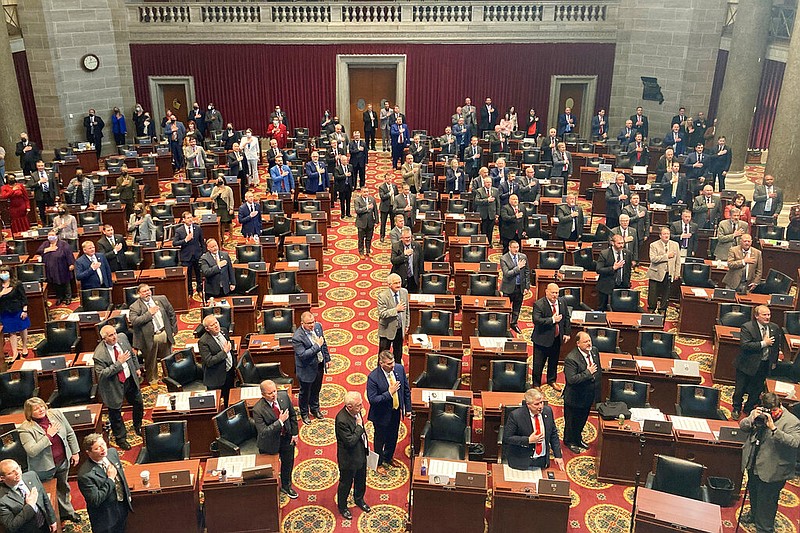As state lawmakers hit the ground running this legislative session, so too are House staff.
Legislators returned to the Capital City earlier this month anticipating a packed agenda with a record number of bills pre-filed and several issues -- including congressional redistricting, state employee raises, gubernatorial appointments and supplemental budget appropriations -- given priority deadlines.
The active start to the session also means House staff are more involved.
"We've been very busy this year, busier than we usually are the first weeks of session," said Dana Rademan Miller, the nonpartisan chief clerk and House administrator.
The COVID-19 pandemic caused delays in getting 2020 census results to the states to draw congressional maps, which has forced a tight deadline on the Missouri Legislature. The state is also looking to spend a massive supplemental budget bill.
Those two issues have been priorities for House staff, Miller said.
Additionally, staff are working on a record number of bills and have a record number of requests.
As of Jan. 10, members of the House have made 2,032 bill draft requests, some of which have been completed and others remain in progress.
"And that is a record from our prior record, which was set in 2020," Miller said. "And 2021 was near record. It's just every year we tend to file more bills, request more bills."
The House also pre-filed a record number of bills this year.
As of Jan. 13, 1,065 bills have been filed in the House -- 295 of which have been first read and 166 of those have been sent to a committee.
"These are just draft requests, meaning that the member has requested a draft but it doesn't mean that they'll file it," Miller said. "But it's a lot larger number, so that gives you an idea of what our seven or eight drafting attorneys do. They sit down and plug away at all of this."
Miller said staff is keeping up with the rising demand in large part because of a new drafting program developed in-house and implemented this year.
The program takes out a lot of the manual operations previously required of the legislation drafters by automatically pulling data from existing state statutes, Miller said.
Bill drafts usually begin with existing statutes and are written as amendments to the existing state law.
"It's really a smart program because it auto- populates a lot of the format that we used to have to just do by hand," Miller said.
She said the House's previous software became too antiquated and was no longer providing help desk support.
Miller said she tells staff to pace themselves throughout the session because, "there's no emergency until usually the end of session."
But this year in particular, "It's a busy place," she said.
The House has already started the process to retain necessary employees -- such as secretarial, administrative, research, budget and support personnel -- with House Resolution 3268. As usual, the resolution caps the number of necessary employees to not exceed what appropriations allow.
The resolution, filed by Rep. Jason Chipman, R-Steelville, will be considered Tuesday by the House Administration and Accounts Committee.
The Administration and Accounts Committee, which Chipman chairs, generally supervises House business affairs, including staffing.
Also Tuesday, the House Administration and Accounts Committee will consider legislation to remove the requirement that the House and Senate pass a resolution detailing employment plans for when the General Assembly isn't in session.
Currently, state statute calls for the House and Senate to pass a resolution to continue employing necessary staff at their regular salaries and set the terms of employment for the time between sessions.
HB 1600, sponsored by Chipman, simply removes the requirement that the House and Senate pass a resolution to maintain staff employment. A similar piece of legislation previously passed in the House but died in the Senate.
Miller said the bill would help cut through some of the antiquated red tape still found in state statutes.
Statutes requiring a resolution to maintain staff date back to the 1920s and 1930s.
"If we go back to that era, it was a different legislature," Miller said. "We were bi-annual, meaning we met every other year, and we had fewer employees."
Miller said the update would better reflect current practices.
She said the House still has some part-time or session-only staff, but the chamber has a significant number that are full-time, administrative staff working year round.
Legislator assistants also vary from full-time to part-time, Miller said.
"What we do now works, it's just every year he's got to do the resolution," Miller said.
A variety of legislative activities occur during an interim, Miller said, such as interim committee business and reviewing and archiving records.
Miller also noted the prevalence of special sessions in recent years. The state has averaged two per year for the past five years.
House staff also begin preparing for the session well before its January start. Bill drafting, for example, begins in October and is done by House staff.

